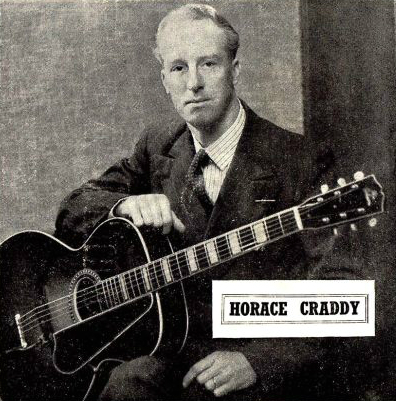Horace Craddy ~ Plectrum Guitarist
 Horace Craddy – born at Bristol in 1902. His father & uncle played a Banjo double act for many years, so poor Horace had no chance. Edward Craddy’s sons Wilfred & Horace became well-known players. Wilfred played Piano accompaniment to his brother’s Fingerstyle Banjo. As a boy Horace won the Gold Medal in a National Competition; he later played in the John Birmingham Orchestra, made Radio Broadcasts, and played in Kentucky Minstrel shows in Bristol. From the 1920s he switched mainly to Plectrum Banjo, following a trend brought about by Jazz & Dance Bands. By then, the 5-String Banjo had become less common in ‘Commercial’ popular music. According to Mike Redman, Horace Craddy ordered a Tenor Banjo from America, and it arrived by horse & carriage wrapped in Velvet, with a metal zip.
Horace Craddy – born at Bristol in 1902. His father & uncle played a Banjo double act for many years, so poor Horace had no chance. Edward Craddy’s sons Wilfred & Horace became well-known players. Wilfred played Piano accompaniment to his brother’s Fingerstyle Banjo. As a boy Horace won the Gold Medal in a National Competition; he later played in the John Birmingham Orchestra, made Radio Broadcasts, and played in Kentucky Minstrel shows in Bristol. From the 1920s he switched mainly to Plectrum Banjo, following a trend brought about by Jazz & Dance Bands. By then, the 5-String Banjo had become less common in ‘Commercial’ popular music. According to Mike Redman, Horace Craddy ordered a Tenor Banjo from America, and it arrived by horse & carriage wrapped in Velvet, with a metal zip.
 By 1929, there was a Craddy Music Shop in Gloucester Road, Bristol (BMG 1928-29) and Horace Craddy was teaching 5 String & Tenor Banjo at Whitehall, East Bristol. He taught Tenor Banjo & Guitar to many Musicians who went on to play in local Jazz & Dance bands. The Craddy Brothers themselves played in a Dance Band with another tenor player, Gordon Dando.
By 1929, there was a Craddy Music Shop in Gloucester Road, Bristol (BMG 1928-29) and Horace Craddy was teaching 5 String & Tenor Banjo at Whitehall, East Bristol. He taught Tenor Banjo & Guitar to many Musicians who went on to play in local Jazz & Dance bands. The Craddy Brothers themselves played in a Dance Band with another tenor player, Gordon Dando.

Their Band was based at Packer’s Chocolate Factory in Whitehall where Horace was a Salesman.
It was at the Packer’s Hall that Ray Andrews had heard zither banjo player and composer, Olly Oakley perform in the late 1930s.
He was also a Pupil of Tarrant Bailey Snr. (Video below Tarrant Bailey Jr) and he, in turn, gave his 1st Banjo Lesson when he was only 13! With his brother Wilfred (usually on Piano) he performed in the Bristol Area for over 40 years.
 Jack Toogood Guitarist, emphasises the fact that the real foundation for his subsequent musical success came from the instruction he received from Horace Craddy. From this Teacher he also became aware of Eddie Lang, Kress, McDonough and, later, Django Reinhardt and he started collecting the recordings of these famous players of the Plectrum Guitar which have so influenced his own style of execution. Jack Toogood recalls that studying anything at this period was far from easy. It was Wartime and he was required to take the Insurance Examinations by his Employers and had to study for these at the same time as he was struggling with the Guitar. He said he made the fatal mistake of resting his Insurance Test papers on a copy of Eddie Lang’s “Fingerboard Harmony!”
Jack Toogood Guitarist, emphasises the fact that the real foundation for his subsequent musical success came from the instruction he received from Horace Craddy. From this Teacher he also became aware of Eddie Lang, Kress, McDonough and, later, Django Reinhardt and he started collecting the recordings of these famous players of the Plectrum Guitar which have so influenced his own style of execution. Jack Toogood recalls that studying anything at this period was far from easy. It was Wartime and he was required to take the Insurance Examinations by his Employers and had to study for these at the same time as he was struggling with the Guitar. He said he made the fatal mistake of resting his Insurance Test papers on a copy of Eddie Lang’s “Fingerboard Harmony!”